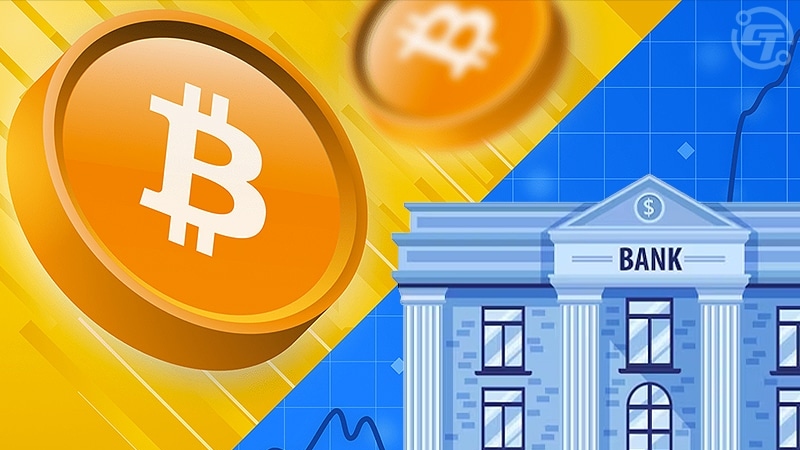Bitcoin's Impact On Traditional Banking - Adapting To The New Financial Frontier
Explore Bitcoin's impact on traditional banking. Uncover decentralization, challenges, and opportunities in the evolving financial landscape.
Author:James PierceReviewer:Camilo WoodFeb 12, 2024305 Shares16.9K Views

Bitcoin, the first and most well-known cryptocurrency, has sparked significant interest and debate since its inception in 2009. As a decentralized digital currency, it operates outside the traditional banking system, challenging the conventional financial landscape. In this exploration, we will delve into the multifaceted Bitcoin's impact on traditional banking, analyzing the implications for financial institutions, regulatory bodies, and the broader economy.
Let's discuss Bitcoin's impact on traditional banking in detail:
Decentralization And Financial Independence
Traditional banking procedures can be significantly improved by cryptocurrency, becoming more rapid, secure, and effective. The decentralized structure of cryptocurrencies eliminates the need for middlemen like banks, which makes transactions much easier and less expensive. This is one of its biggest advantages.
At the core of Bitcoin's impact is its decentralized nature. Operating on a blockchain, a distributed ledger technology, Bitcoin eliminates the need for a central authority, such as a bank, to facilitate transactions. This decentralization grants users greater financial independence, allowing them to transact directly with one another without relying on traditional banking intermediaries.
Increased Competition
The financial business is becoming more competitive due to the rise of Bitcoin. Customers searching for financial services no longer have to limit their options to traditional banks. Exchanges for cryptocurrencies and other fintech businesses have joined the market with cutting-edge goods and services.
The heightened rivalry has compelled established banks to adjust and introduce novel ideas. In an evolving industry, banks are now making technological investments to enhance their offerings and maintain their relevance. For instance, the underlying technology of cryptocurrencies, blockchain technology, is being investigated by several institutions.
Financial Inclusion
Bitcoin has the potential to address issues of financial inclusion by providing a decentralized and borderless alternative. Individuals without access to traditional banking services can participate in the global economy through Bitcoin. This is particularly relevant in regions where banking infrastructure is underdeveloped or inaccessible, empowering the unbanked or underbanked population.
Reduced Transaction Costs
Traditional cross-border transactions often incur significant fees and delays due to intermediary banks and currency conversion processes. Bitcoin's decentralized nature enables faster and more cost-effective cross-border transactions, reducing the friction associated with traditional banking systems. This efficiency can be particularly advantageous for international businesses and individuals engaged in global trade.
Challenges To Monetary Policy
Bitcoin's limited supply, capped at 21 million coins, stands in contrast to traditional fiat currencies, which can be subject to inflationary pressures controlled by central banks. This fundamental difference challenges traditional monetary policy models, as Bitcoin's scarcity may impact the traditional levers of economic control, such as interest rates and money supply regulation.
Emergence Of Central Bank Digital Currencies (CBDCs)
In response to the rise of cryptocurrencies like Bitcoin, several central banks are exploring or developing their own digital currencies. These Central Bank Digital Currencies (CBDCs) aim to harness the advantages of digital currencies while maintaining centralized control. The development of CBDCs can be seen as a strategic response to the disruptive potential of decentralized cryptocurrencies.
Security Concerns
While Bitcoin offers enhanced security through cryptographic principles, the digital nature of cryptocurrencies also presents new challenges. Concerns such as hacking, fraud, and unauthorized access to digital wallets have arisen, prompting the need for robust cybersecurity measures. Traditional banks, too, must adapt and fortify their security protocols in response to the evolving threat landscape.
Regulatory Dilemmas
Bitcoin's decentralized nature has posed challenges for regulatory bodies worldwide. Striking a balance between fostering financial innovation and mitigating risks, governments and regulatory agencies grapple with the task of developing frameworks that address anti-money laundering (AML) and know your customer (KYC) requirements without stifling the growth of the cryptocurrency sector.
Impact On Traditional Banking Revenue Models
The rise of Bitcoin and other cryptocurrencies has the potential to disrupt traditional banking revenue models. With decentralized finance (DeFi) platforms offering services such as lending, borrowing, and yield farming without intermediaries, traditional banks face competition in areas that were once exclusively within their domain. This dynamic could reshape the financial services landscape and force traditional institutions to innovate or adapt.
Volatility And Market Sentiment
Bitcoin's price volatility has implications for broader market sentiment and economic dynamics. Fluctuations in the value of Bitcoin can impact investor confidence, potentially affecting traditional financial markets. Additionally, the speculative nature of Bitcoin trading introduces an element of unpredictability that traditional banking institutions must monitor and navigate.
Evolution Of Banking Services
Some traditional banks have embraced the opportunities presented by cryptocurrencies, integrating services like cryptocurrency custody, trading, and investment products. Others remain cautious, perceiving cryptocurrencies as a threat to their established business models. The evolving relationship between traditional banks and cryptocurrencies will shape the future landscape of financial services.
Bitcoin's Impact On Traditional Banking - FAQs
How Does Cryptocurrency Affect Traditional Banking?
Cryptocurrencies can drastically cut the cost and time needed for remittances by doing away with the need for middlemen, making it more accessible and inexpensive for individuals. The idea of decentralization is another noteworthy way that cryptocurrencies are influencing conventional banking.
What Is The Benefit Of Bitcoins Over Traditional Currency?
The decentralized nature of cryptocurrencies like Bitcoin allows for faster and less expensive money transfers. It doesn't break down at one particular spot.
Can Bitcoin Contribute To Financial Inclusion?
Yes, Bitcoin has the potential to bridge gaps in access by providing a decentralized and borderless alternative, empowering the unbanked or underbanked population.
What Challenges Does Bitcoin Pose To Traditional Monetary Policy?
Bitcoin's limited supply challenges traditional monetary policy, impacting the control mechanisms of central banks, such as interest rates and money supply regulation.
What Security Concerns Arise With Bitcoin And Traditional Banking?
While Bitcoin offers enhanced security through cryptography, new challenges, such as hacking and unauthorized access, prompt both Bitcoin users and traditional banks to fortify cybersecurity measures.
Are Traditional Banks Integrating Bitcoin Services?
Some traditional banks are integrating Bitcoin services like cryptocurrency custody, trading, and investment products, while others remain cautious, perceiving cryptocurrencies as a potential threat.
Conclusion
Bitcoin's impact on traditional banking is profound and multifaceted, encompassing decentralization, financial inclusion, reduced transaction costs, challenges to monetary policy, security concerns, regulatory dilemmas, and the evolution of banking services.
As the cryptocurrency ecosystem continues to evolve, traditional banking institutions must navigate these challenges and opportunities to remain relevant in a rapidly changing financial landscape. The coexistence and collaboration between traditional and decentralized financial systems will likely define the future of global finance.
Jump to
Decentralization And Financial Independence
Increased Competition
Financial Inclusion
Reduced Transaction Costs
Challenges To Monetary Policy
Emergence Of Central Bank Digital Currencies (CBDCs)
Security Concerns
Regulatory Dilemmas
Impact On Traditional Banking Revenue Models
Volatility And Market Sentiment
Evolution Of Banking Services
Bitcoin's Impact On Traditional Banking - FAQs
Conclusion

James Pierce
Author

Camilo Wood
Reviewer
Latest Articles
Popular Articles

